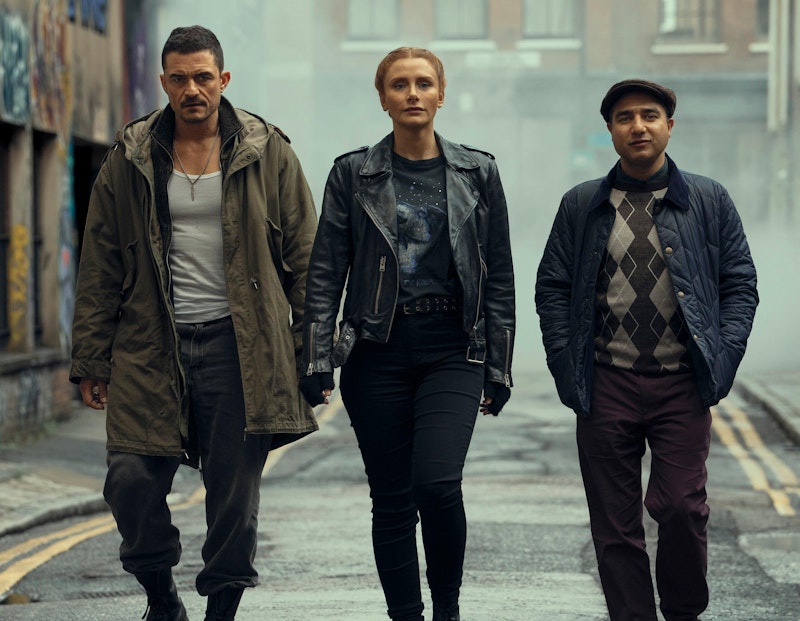Deep Cover is the story of three struggling actors, each of whom have struggled to find work within an industry where connections are more important than talent. Hugh (Nick Mohammed) is a lowly IT help desk employee who’s terrified to speak to his co-workers in a casual manner, but has found a freedom to express himself when on a stage. Swift (Orlando Bloom) is a more seriously-minded, classically-trained thespian who’s aspired to do the type of “method acting” lionized by Marlon Brando or Dustin Hoffman, but has only been offered undesirable roles in commercials. Kat Boyles (Bryce Dallas Howard) has managed to live her dream as an acting teacher and improv coach, but has experienced embittered jealousy, as her students have gone on to find more fruitful careers.
Although each member of this trio is a familiar archetype, Amazon Prime’s Deep Cover is surprisingly earnest in its depiction of the intensely competitive nature of a career in acting. Each character has a different long-term goal in mind that’s only slightly out of reach. Hugh desires a community that’ll accept him, but has been denied a space in which he feels comfortable. Kat has wanted the opportunity to be a role model, but has been eclipsed by her pupils in an industry centered around “young blood.” Swift may only be in it for the art itself, but the measly gigs he’s been offered haven’t allowed him to apply his immersive capabilities.
There’s a sense of melancholy that’s intrinsic to stories about the underlings of the arts community, but Deep Cover doesn’t waste much time before its “high concept” is kicked in. Given their abilities to adapt their performative skills to a revolving set of scenarios, Kat, Swift, and Hugh are recruited by Detective Sergeant Graham Billings (Sean Bean), a Metropolitan Police assigned to bust a low-level cigarette smuggling operation. It’s too easy to identify an undercover cop, so Billings has theorized that legitimate actors might be better suited for the sting. Although they’re given a loose outline of the goals that the cops have in mind, Kate, Swift, and Hugh have the freedom to use any means necessary to gain the trust of their targets.
It’s a fun idea for a sketch, but Deep Cover’s stakes are heightened when the team’s skills lead them to an unexpected discovery. After a counterfeit cabal is foiled, Kat, Swift, and Hugh are faced with the criminal mastermind Fly (Paddy Considine), who’s convinced they’re necessary to fulfill his obligation to the mob boss Metcalfe (Ian McShane). Any notion of believability is gone at this point, but it’s amusing for the supporting characters to so clearly resemble the type of archetypal roles often seen in caper films. Considine’s sneering, yet unusually honor-bound thug is an amalgamation of prototypical delinquents that go back to The French Connection; on the flipside, Bean’s role as a stone-cold, serious law enforcement official is so upfront in his intentions that it’s not hard to anticipate a twist.
On a conceptual level, the satirical undertones of Deep Cover gave it the potential to rank among other recent genre satires, such as Game Night or Hit Man, which successfully lampooned the similarities between crime fiction and an unrelated subculture. Yet, Game Night was a theatrical release, and Hit Man was shot independently before being acquired by Netflix; Deep Cover was almost certainly designed for streaming from its inception, and the evidence is there in the production value. While all of the sets are adequate, they lack personality, and most of the action has something to be desired.
Director Tom Kingsley, acclaimed for his work on Ghosts and Doctor Who, isn’t entirely comfortable with a feature-length narrative, as the tension is evaporated by the time that the third act’s initiated. At 100 minutes, Deep Cover is too short for its twists and turns to have an impact, but still hindered by long stretches of inaction. Although the awkwardness of some situations is critical to the comedy, Deep Cover is resolved in a poetic way, which feels like a betrayal of its messier early moments.
Nonetheless, that these minor quibbles can be ignored is a reflection of the film’s theme; anything can be sold with a little personality. Since Kat, Swift, and Hugh are reliant on larger–than-life performances to get them out of trouble, it makes perfect sense that Deep Cover’s cast is more interesting than its situational hijinks. Part of this is derived from how self-referential each of the performers are willing to be. Mohammed, most famous for his Emmy-nominated role in Ted Lasso, has struggled to avoid being typecast. Howard, a much better director than actress, has done her best in material that’s beneath her. Bloom’s role is perhaps the most comical, as Swift’s unbridled intensity is similar to the grim, humorless heroes that the actor once portrayed in Kingdom of Heaven, Troy, and the Pirates of the Caribbean franchise.
Deep Cover may have worked better as an extended series, but then again, it's unlikely that the assembled cast would’ve been available for that commitment. The streaming economy has been oddly centered on a style of slightly meta action-comedies with just-past-their-prime stars; Chris Evans’ Ghosted, Jamie Foxx’s Back in Action, Mark Wahlberg’s The Union, Jennifer Lopez’s The Mother, and Ryan Reynolds’ The Adam Project are all different films available to stream on Netflix. To say that Deep Cover is vastly superior isn’t much of an endorsement, but it's not a bad way to spend 100 minutes.

